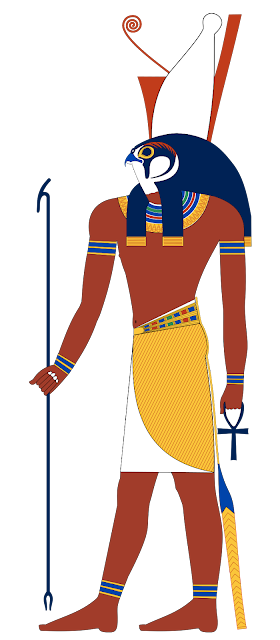The reader who asked me about Cleopatra and Anubis got me thinking...
 |
| By Jeff Dahl - Own work, CC BY-SA 4.0, https://commons.wikimedia.org/w/index.php?curid=3280569 |
Horus is one of the most significant deities in ancient Egyptian religion and mythology. He was worshipped as a god of the sky, war, and protection, and was believed to be the son of Osiris and Isis. Horus was also associated with the pharaohs of Egypt, who were considered to be his earthly representatives.
Horus was usually depicted as a falcon-headed god, or as a man with the head of a falcon. The falcon was a powerful symbol of the sun and the sky, and Horus was often depicted with a sun disk on his head or as a falcon flying across the sky. In some depictions, he was shown with a human body and the head of a hawk, which was another bird associated with the sun and the sky.
One of the most important myths surrounding Horus is the battle with his uncle, Set, who had murdered his father, Osiris. Horus was said to have challenged Set to a series of contests to determine who would rule Egypt. In one of these contests, Horus lost an eye, which was later restored by the god Thoth. Horus ultimately emerged victorious, and became the ruler of Egypt.
Horus was also closely associated with the pharaohs of Egypt, who were believed to be his earthly representatives. The pharaohs were often depicted wearing a crown with the symbol of Horus, and were said to be protected by the god in battle. In some myths, the pharaoh was said to be the living embodiment of Horus, and was believed to have the power to control the sun and the sky.
In addition to his role as a god of the sky and war, Horus was also associated with protection and healing. He was often invoked by people seeking protection from harm, and was believed to have the power to heal the sick and injured.
Horus was worshipped throughout ancient Egyptian history, and his cult was particularly prominent during the Old Kingdom and the New Kingdom periods. Temples dedicated to Horus were built throughout Egypt, and the god was often depicted in art and architecture.
Today, Horus remains an important figure in Egyptian mythology and religion, and his image can be found in museums and art galleries around the world. He is often depicted as a symbol of strength, protection, and victory, and his legacy has had a lasting impact on Egyptian culture and history.
Source: Some or all of the content was generated using an AI language model


No comments:
Post a Comment
Contact The Wizard!
(he/him)